Editor; Please use only Goodspeak allowed your Block Steward. Thoughtcrime words not good, them spread rebellion beloved Big Sister MASTER not like. Doublegoodthought.
A freedom of information request has given some unique insight into the U.S. Department of Homeland Security.
The list of words used by the department to monitor online activity for signs of terrorism or threats against the U.S. has been made publicly available. There are plenty of words on the list that you would expect to see there, like "Al Qaida" and "dirty bomb," but it's the inclusion of seemingly mundane terms like "bacteria" and "Mexico" that has piqued the interest of some.
A 39-page PDF document called "Analyst's Desktop Binder" that highlights all the words Homeland Security watches for in online usage is now available online for perusal, The Daily Mail reports. Department chiefs insist the list is not intended to look for general negative remarks about the government, but it serves as a tool to make them aware of potential threats against the country.
The list was requested, obtained and posted by a privacy watchdog called the Electronic Privacy Information Center, who sued in order to get access to the documents. They have described the list as 'broad, vague and ambiguous,' according to The Daily Mail.
It seems the agency does agree that the list is in need of updating. Homeland Security spokesman Matthew Chandler told Huffington Post in February that the list is now under review to ensure it can "clearly and accurately convey the parameters and intention of the program."
As Forbes highlights, another interesting insight offered in the document is just how Homeland Security monitors those keywords. The "Analyst's Desktop Binder" indicates that the list words are watched through TweetDeck, and their information is kept on a Mac Mini. There is no indication whether this has changed since the document's release.
Here's the full list of words:
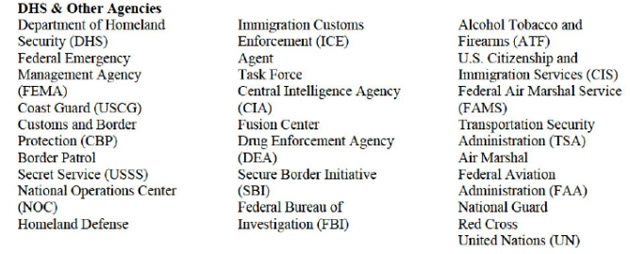
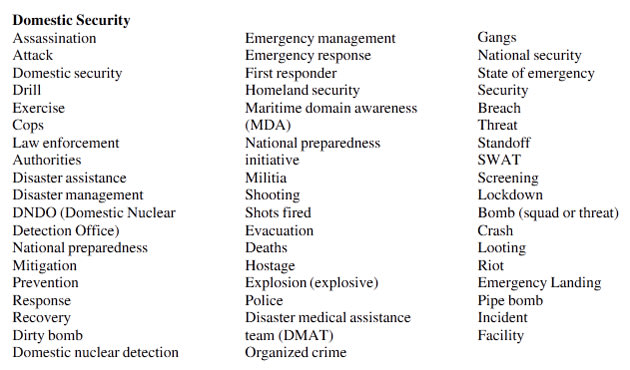
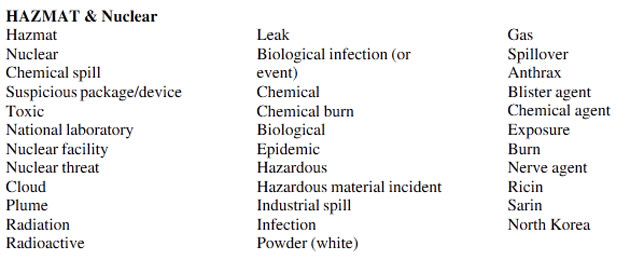
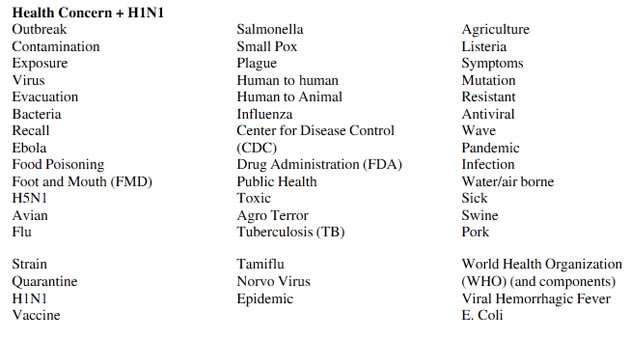
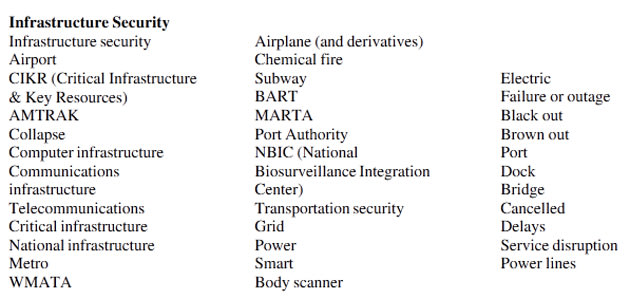
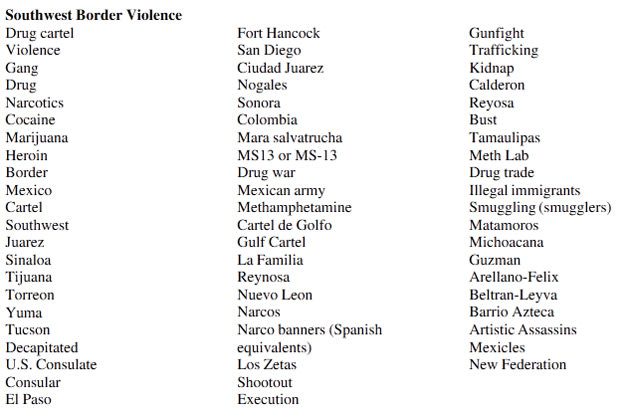
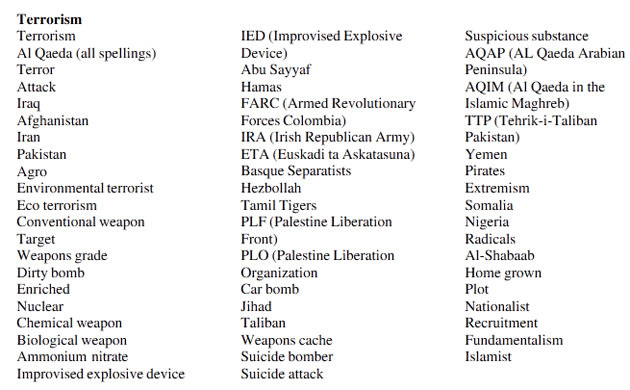
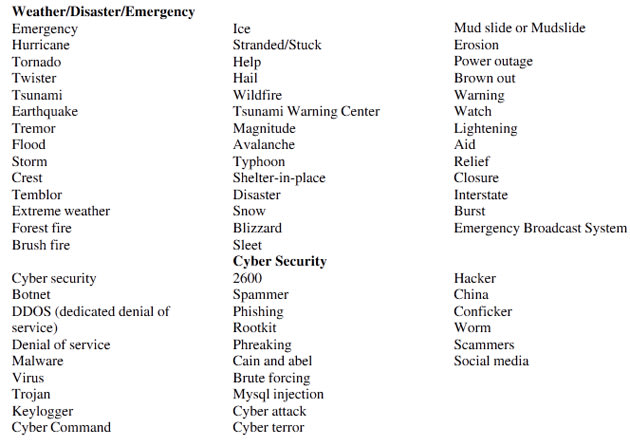
Replies
The ultimate example of Big Government gone bad: North Korea secretly murders its own officials
Thursday, May 31, 2012 by: J. D. Heyes
60
(NaturalNews) Just what is a rogue, all-powerful government capable of doing to its own citizens? What about its own officials? The answer lies in North Korea, the Stalinist state that has been ruled by a succession of power-mad dictators who seem to have gotten more brutal as the lineage progresses.
Amnesty International, in a recent report on the human rights records of scores of nations, found that last year the North Korean government "purged" - that is, got rid of - at least 30 of its own government officials, while an additional 200 were rounded up by the State Security Service in January as a precaution ahead of the transfer of power from Kim Jong-il, who died of an apparent heart attack in December, and his 29-year-old son, Kim Jong-un.
And the supposed wrong-doings of these 30 officials? High crimes and treason? Planning to overthrow the regime?
Nothing so compelling or serious. They were killed because they engaged in failed talks with South Korea - talks that, by the way, would never have taken place in this authoritarian state without the permission of the "Dear Leader," Kim Jong-il, himself.
Killed for doing their job
Of the hundreds who were rounded up, the Daily Telegraph reported, some of them were also executed. Many of those remaining probably wish they had been killed; they were sent to political prison camps - part of the country's gulag system which Amnesty International said holds about 200,000 North Koreans who are kept in "horrific" conditions.
It's all just part of the job in North Korea. Officials who are seen to have failed the regime in some way are often executed or jailed, even though they are merely carrying out the orders or instructions of higher-ranking bureaucrats or ruling family members. Talk about your incentives program.
Consider this example.
In 2010, Pak Nam-gi, the one-time head of the country's finance ministry, failed miserably in his attempt to reform the impoverished nation's currency. As a result of his efforts, inflation was rampant and already existing food shortages became worse. Pak died by firing squad for that little letdown.
The 30 who "disappeared" were unable to improve ties to South Korea and as such, they were made to be scapegoats for Pyongyang's new low in relations with Seoul.
Setting the bureaucrats up for failure
Part of the reason for their failure, without question, was the late Kim's insistence, no doubt, that Pyongyang continue its nuclear weapons and intercontinental ballistic missile development, something South Korea has, up to now, considered a deal-breaker from the start when it came to improving ties with its northern neighbor.
And those ties are only likely to get worse, following Pyongyang's failed missile launch attempt (the government said it was trying to launch a satellite into orbit, not test a missile) in April. Now, the North appears ready to also conduct another underground nuclear weapons test. Wouldn't you hate to be a North Korean negotiator right about now?
"The North Korean regime is hell-bent on being a belligerent actor," Rep. Ileana Ros-Lehtinen, R-Fla., who heads up the House Foreign Affairs Committee, said during a recent visit with South Korean leaders. "And I think that on holidays or sad commemorations like Memorial Day weekend is when the leadership tries to provoke the democratic allies into action."
It could happen here, too, because it already has
The behavior of North Korea's elite leadership could portend what will eventually happen in the United States, if Washington's insatiable thirst for more authority isn't quenched and if the right conditions are present.
Sound impossible?
There have been periods of absolute authoritarianism throughout our history, from the earliest mobilizations of federal militia to put down the Shay's and Whiskey Rebellions, to President Abraham Lincoln's suspension of habeas corpus during the Civil War, to FDR's outlawing of gold ownership during the Great Depression and the jailing of Japanese-Americans during World War II, to the Bush administration's passage of the PATRIOT Act, to the current administration's targeting of American citizens overseas who are only "suspected" of being terrorists.
What would happen if, say, the U.S. began to suffer sustained terrorist attacks? Do you think our civil liberties would be strengthened - or weakened? The tendency would be to become more authoritarian, as it has always been, and of course, it would be for our own protection.
There is a saying that goes, "Power corrupts, and absolute power corrupts, absolutely." It not only applies to North Korea, it applies to any country whose leader is "above the fray" and not held to account.
Sources for this article include:
http://www.telegraph.co.uk
http://www.the-privateer.com/1933-gold-confiscation.html
http://quod.lib.umich.edu
Learn more: http://www.naturalnews.com/036033_North_Korea_government_murder.htm...
Please use only Goodspeak allowed your Block Steward. Thoughtcrime words not good, them spread rebellion beloved Big Sister MASTER not like. Doublegoodthought.